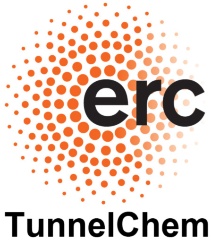Science
Quantum mechanical tunneling of atoms is emerging as an ubiquitous phenomenon in chemistry. Most chemical reactions including a hydrogen transfer can be expected to be influenced by tunneling at room temperature. While simulations can monitor tunneling directly, experimental approaches can only detect the consequences. We build on our significant algorithmic improvements of the last few years, which allow accurate predictions of tunneling rates in larger systems than previously possible.
We investigate aspects of tunneling in several different areas of chemistry:
- Astrochemistry: Several astrochemical processes can only be understood if their tunneling contributions are appropriately accounted for. Accurate tunneling rates will significantly improve the predictive power of models of the interstellar medium.
- Biochemistry: Investigating tunneling contributions to enzymatic reactions will allow to plan modifications that increase selectivity and efficiency.
- Catalysis: Many processes in homogenous and heterogenous catalysis involve tunneling. A fundamental understanding of the principles involved allows for the design of improved catalysts.
- Methods: Further development of methods and algorithms in accordance with the demands of the applications is required.
Only such a combined effort may allow us to exploit the tunnel effect for optimizing reactivity and selectivity of chemical reactions in biochemistry and catalysis.
See also information on TUNNELCHEM by the ERC.


